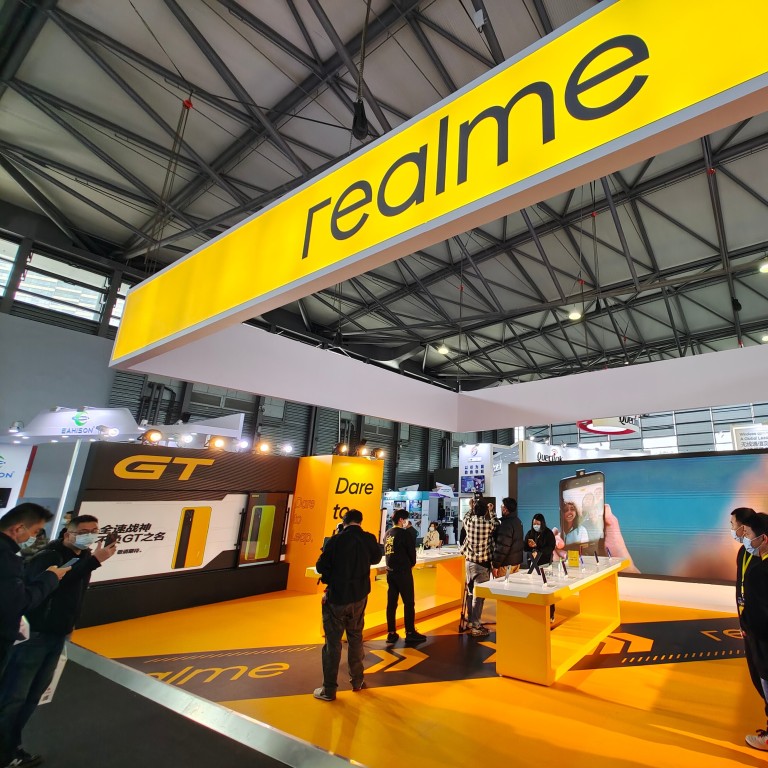
Realme founder plays down impact of India’s Covid-19 crisis on budget smartphone maker, saying demand could take off once worst is over
- Realme founder says he is not too worried by the pandemic and hopes the company can ship 70 million phones in 2021
- India has been crucial for Chinese smartphone makers looking for growth amid market saturation back home but Covid-19 crisis is now weighing
India’s recent surge in Covid-19 infections is not only a public health tragedy, it is also playing havoc with the country’s ambitions to be a smartphone manufacturing superpower and the plans of many Chinese tech companies to ramp up operations there.
One of those companies affected is Chinese vendor Realme, a top 5 smartphone brand in India, which said on Tuesday that it has “adjusted its timeline of product launches in India based on the local situation”. This adjustment came after market research firm TrendForce forecast that India would see a 7.5 per cent annual decrease in smartphone production this year.
“Our current business development in India has inevitably been affected [by the Covid-19 crisis],” said Sky Li Bingzhong, Realme’s founder, in a recent interview with the South China Morning Post in Shenzhen. Li said his current priority is the safety of employees and he has been offering any staff affected help with vaccination and other health care costs.
However, Li said he believes Realme’s business in India can recover quickly and that global growth momentum will continue as “the situation hopefully improves”. India is currently grappling with the world’s worst Covid-19 outbreak, with daily cases of 329,942 and deaths of 3,876 on Tuesday, according to the country’s health ministry.
“The pandemic has impacted the whole smartphone industry, but [it] is limited and temporary,” said Li, who established Realme in India three years ago. “The smartphone is an essential product and demand will not disappear. Once the pandemic crisis eases, smartphones could sell more than ever.”
Li said he is not too worried by the pandemic and hopes the company can ship 70 million phones in 2021, with annual growth of 50 per cent despite Covid-19 and chip supply constraints. Shipments in India accounted for more than 45 per cent of the brand’s global total last year, according to industry research firm IDC.

“People are not venturing outside their home unless they absolutely need to,” Kaur said. “[Online retailers] are only providing essentials, and smartphones are not considered an essential.”
India has been crucial for Chinese smartphone makers looking for growth amid market saturation back home. Their devices have proven popular for their affordability, and popular brands such as Xiaomi, Oppo, Vivo and Realme could bear the brunt of declining sales.
Realme is clearly hedging its bets – after achieving success in India it said in May 2019 that it was targeting its home market in China, with the aim of becoming a leading player there.
“China is the most competitive market with the strongest rivals … it is the most important market for all leading smartphone brands with the fiercest competition,” said Li.
The competition to be top dog in China intensified in the past year after former market leader Huawei Technologies Co saw its smartphone business hobbled by restrictions imposed by Washington that limit its access to advanced US technologies.
Last year, Realme had the fastest growth among Chinese vendors, shipping 42.4 million units globally with annual growth of 65 per cent, according to data from research firm Counterpoint. In the fourth quarter, it had 2 per cent market share in China, up from zero previously.
Realme, along with Vivo and Oppo, are owned by BBK Electronics Corporation, a decades-old device maker established by Duan Yongping who imprinted “benfen” onto these firms, which roughly means to adhere firmly to one’s own principles.
“I follow the values imprinted on our company – do what you should do, do the right thing,” Li said.
Realme originated as a sub-brand under Oppo, one of China’s top smartphone brands, before spinning off as an independent division in 2018 and starting operations in India.
“I was head of Oppo’s overseas operations at that time, and I noticed that young Indian users preferred to buy phones online, but were not always happy with the products available, which were often poorly designed or had bad performance at a high price,” said Li. “We wanted to establish a brand for young people with high quality and a fashionable design.”
Realme runs its own research and development unit as well as product planning and marketing teams, but has access to Oppo’s supply chain, a model that has allowed the vendor to have lighter assets and consequently fewer costs.
Realme has been competing directly against some handset models from Hong Kong-listed Xiaomi in the lower-end of the smartphone market. By contrast, Li says the company will move further into the high-end segment as it ramps up in China.
Like all smartphone vendors, Realme has also been affected by the current global chipset shortage, but Li said the company has been able to maintain a fast pace of new product launches because it “has taken active measures to deal with it”.
“First, we had an advanced plan for our chip requirements, which alleviated some of the pressure,” he said. “Secondly, we adopted a dual-platform and dual-flagship product strategy, which can also reduce pressure by allowing us to select chips from different manufacturers for different product features.”

